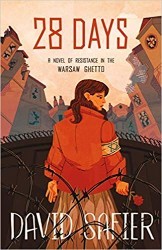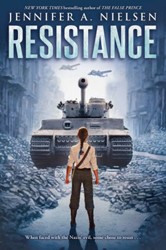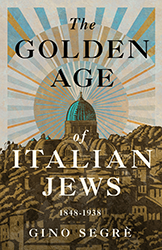While some believe that Holocaust narratives have been overemphasized in young-adult literature, there are many stories of victims, survivors, and rescuers that have not been fully told. Dominic Carrillo’s Acts of Resistance chronicles the unusual history of Bulgaria, where strong resistance to Nazi persecution enabled most Jews to survive the war. Based on documents from the Bulgarian National Archives, which were suppressed under Communist regimes, the novel alternates between the perspectives of three characters living in intolerable circumstances.
Lily is a young woman employed by the Commissariat for the Jewish Question, a government office as ominous as its title suggests. Having initially believed propaganda that she was involved in saving her country from internal enemies, she realizes that she has become an accomplice to mass murder. When she witnesses the deportation of Jews from Macedonia, which has been occupied by Bulgaria, Lily understands that an alliance with the Nazis has made her and her fellow citizens complicit in their crimes. Peter, meanwhile, is a high school student with Jewish neighbors and friends. He is at first incredulous to learn that these innocent people are facing the imminent threat of death. And Misho, a Jewish boy living under the archbishop’s protection, is terrified by his probable future. However, unlike most of Eastern Europe and the Balkans, when the government began to implement the Final Solution in their country, Bulgarians resisted.
The novel combines historical characters with fictional ones. Lily works for the notorious Alexander Belev, an eager collaborator with Nazi terror. She must balance her instinct to survive with her sense of obligation to her own moral code. Carrillo’s development of her character is convincing, allowing for nuance rather than a sweeping description of heroism. Archbishop Stefan is portrayed as deeply committed to helping Jews: he even pressures the monarch, Tsar Boris III, not to comply with the Nazis. The author successfully relates how a range of factors led to Bulgarian resistance — including the fact that the country was more concerned with saving their own Jews only after those from Macedonia had been killed.
Because the central dilemma involves taking risks in order to protect the most vulnerable, Jewish characters figure less prominently in the narrative than non-Jewish ones. Rabbi Daniel Zion, a leader of his community, is depicted as secondary to Archbishop Stefan in the movement to save Jews. Also strange is the moment in which Rabbi Zion quotes the Christian “Lord’s Prayer.” It would have been appropriate for the author to mention Rabbi Zion’s belief that Jesus was the Jewish messiah — a belief that alienated him from other Jews and led to his censure by the rabbinate in 1943. In a novel like Carrillo’s, the tension between Jewish powerlessness and Christian heroism during the Holocaust demands serious attention. Rabbi Zion’s identification with Christianity should have been considered as part of this difficult contradiction.
Historical exceptions encourage us to ask questions. In this absorbing novel, young-adult readers have the opportunity to find some answers.
Emily Schneider writes about literature, feminism, and culture for Tablet, The Forward, The Horn Book, and other publications, and writes about children’s books on her blog. She has a Ph.D. in Romance Languages and Literatures.





